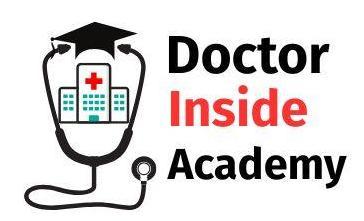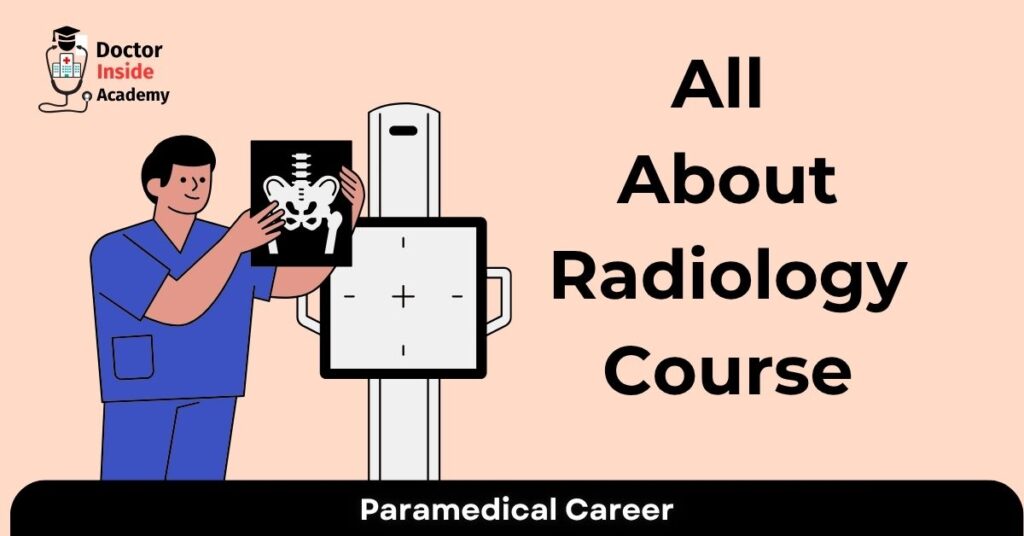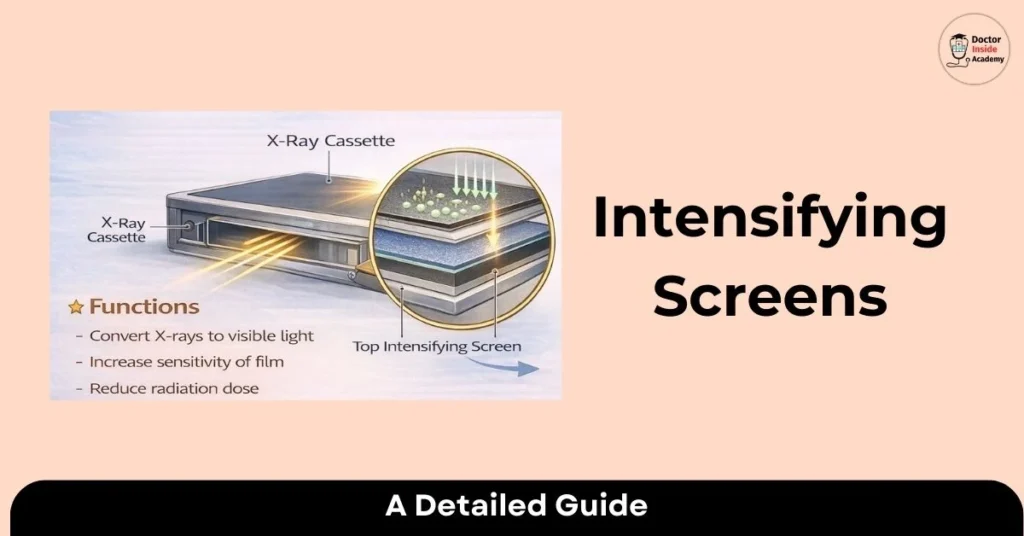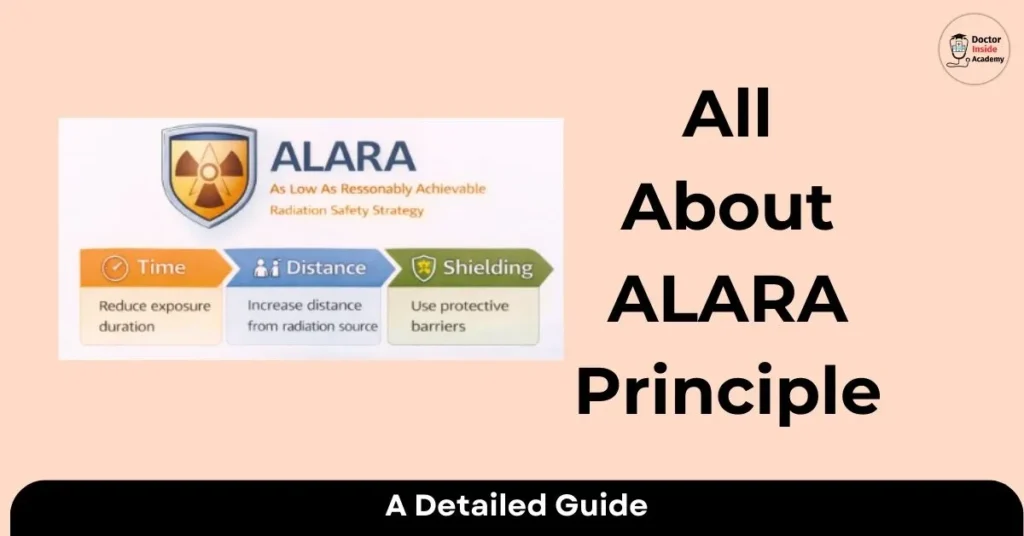The medical specialty of radiology focuses on using imaging techniques to determine and treat diseases. A broad understanding of different imaging modalities, including MRIs, CT scans, ultrasounds, and X-rays, is provided by a radiology course.
The basic principles of imaging technology, radiation safety, patient care, and diagnostic image analysis are all covered in the Radiology course.
One area of medicine is radiology. It makes use of imaging technologies. This includes nuclear medicine, MRIs, CT scans, ultrasounds, and X-rays. Healthcare professionals use them to detect and treat illnesses in the body.
To build a career in radiology, you can pursue many radiology courses at different levels, having different eligibility requirements.
What is Radiology?
Radiology is a rewarding career with many benefits. It combines state-of-the-art technology with the challenge of treating medical conditions. Radiology can be the ideal career choice for you if you have a strong interest in technology and healthcare. There is an urgent requirement for qualified radiation workforces in the healthcare industry, which also offers excellent salaries and the chance to significantly improve patient care.
Why Study Radiology?
Radiology is a unique specialty with many different options that allow you to essentially “choose your adventure” when choosing a job.
Developing Field
As a result of ageing populations and advancements in medical technology, there is a huge and continuous demand for radiology offices.
Job Security
Radiologists have stable and secure job opportunities due to ongoing demands for diagnostic imaging.
Number of Specialisations
You can choose your expertise in radiology by choosing from many subspecialties, including neuroradiology, paediatric radiology, and interventional radiology.
The radiographers can operate in a variety of settings, including clinics, hospitals, private offices, academic organisations, and research facilities.
High Paying Specialty
However, keep in mind that money does not equate to happiness and that your career choice should not be primarily based on your salary.
Radiology Course Details
Here is a detailed table of radiology courses, which are as follows:
| Particulars | Details |
| Duration | Varies: 6 months to 4 years, depending on level |
| Modules Covered | Introduction to Imaging, Anatomy, X-ray, Ultrasound, CT, MRI, Nuclear Medicine, Interventional Radiology, Safety, Emerging Technologies, etc. |
| Practical Training | Hands-on imaging techniques, image interpretation, procedures |
| Assessment | Exams, case reports, and practical evaluations |
| Career Opportunities | Radiologic Technologist, Diagnostic Radiologist, Interventional Radiologist, Nuclear Medicine Technologist, Researcher, etc. |
Different Levels of Radiology Courses
Radiology is a wide field that has a lot of opportunities, and has different levels of courses. Based on your career goal or interest, you can choose any of, are as follows:
Radiology Certificate Programs
Short-term programs called certificate courses in radiology focus on specific aspects of the field, such as MRI or X-ray technology. For individuals who want to improve what they know or secure immediate entry into the sector, these radiology certificates are suitable.
Few Radiology Certificate Paramedical Courses, as listed:
Radiology Diploma Programs
A deeper understanding of radiology can be obtained via diploma programs. They include a wide variety of subjects, such as radiation physics, medical imaging, and radiography procedures, and typically last 1 -2 years.
Few Radiology Diploma Paramedical Courses, as listed:
Undergraduate Radiology Courses
A deep understanding of radiology concepts and techniques may be gained through undergraduate courses like the Bachelor of Science (B.Sc.) in Radiology. These courses cover both theoretical and practical exposure, and they often last 3 to 4 years.
Few Radiology UG Paramedical Courses, as listed:
- BSc in Radiology and Imaging Technology
- BVoc Medical Imaging Technology
Postgraduate Radiology Courses
For those who desire to further specialise, postgraduate programs such as the Master of Science (M.Sc) in Radiology are available. Advanced education in certain radiology specialities and research aspects is often included in these programs.
Doctoral Radiology Programs
Radiology doctoral programs involve an extensive amount of research and contribution to developing novel methods of imaging and technologies. These programs, which concentrate on creating new methods that improve current radiological procedures, are perfect for people who are interested in academic or research-oriented professions.
Radiology Fellowship Programs
Fellowship programs in fields such as interventional radiology offer more specialised instruction in imaging-guided minimally invasive treatments. These courses are designed for radiologists who want to improve their abilities and broaden their career options by becoming experts in certain procedures, including biopsies, catheter implantations, and vascular treatments.
Eligibility Criteria for Radiology Courses
The eligibility criteria for radiology courses differ based on the student’s academic level. The following are some broad rules:
| Academic Level | Eligibility Criteria |
| Diploma in Radiology / Radiography | 10+2 or equivalent qualification with Science stream (Physics, Chemistry, Biology)Minimum aggregate marks (varies by institution, typically 50-60%) |
| Bachelor’s Degree (B.Sc. in Radiology / Radiography) | 10+2 or equivalent with Science stream (Physics, Chemistry, Biology), Minimum aggregate marks (usually around 50-60%). Some institutes may require entrance exams |
| Diploma / Certification in Radiology / Imaging Technology | 10+2 or equivalent with Science stream. Often open to students from general or medical backgrounds |
| Postgraduate Courses (M.Sc. in Radiology / Medical Imaging) | B.Sc. in Radiology, Radiography, or related fieldEntrance exams or merit-based admission |
| Specialized Certifications / Short-term Courses | Usually requires prior qualification in radiology or related healthcare fields. Relevant work experience may be preferred. |
Notes:
- Specific eligibility criteria can vary among institutions.
- Some courses may have age limits or additional entrance requirements.
- It’s advisable to check individual college or university admission guidelines for precise criteria.
Admission Process of Radiology Courses
The following procedures are often included in the radiology course admissions process:
Application Submission
Fill out our application for the course you want to take.
Admission Tests
To evaluate an applicant’s skills and knowledge, several universities require admission examinations.
Interview
Those who make the shortlist can be invited for an interview. Academic achievement, entrance exam results, and interview performance are all possible criteria for admission in a merit-based selection process.
Enrollment
Selected applicants are allowed to continue with the enrollment procedure after being awarded admission.
You can also contact Doctor Inside Academy’s admission counsellor also, to get a brief asap.
Radiology Course Duration
Here, is a detailed breakdown of the duration of many paramedical radiology courses, are as follows:
| Course Type | Duration |
| Diploma in Radiology/Radiography | 1 to 2 Years |
| Bachelor of Science (B.Sc.) in Radiology /Radiography | 3 Years |
| Postgraduate (M.Sc.) in Radiology/Medical Imaging | 2 Years |
| Diploma/Certification in Radiology/Imaging Technology | 6 months to 1 year |
| Short Term Certification Courses | A few weeks to 6 months |
| Specialized Training/Fellowships | 6 months to 1 year |
Note:
Duration may vary depending on the country, institution, and specific course structure. Some diploma courses may be integrated with clinical training, extending the overall duration.
Would you like information about specific courses or institutions? Contact us now!
Jobs After the Radiology Course
After completing your radiology degree, diploma, or post-graduation, here are a few job roles.
| Job Roles | Description |
| Radiologic Technologist (Radiographer) | Operates imaging equipment to capture images for diagnosis. |
| MRI Technician | Specializes in performing MRI scans for detailed internal imaging. |
| CT Scan Technologist | Conducts computed tomography scans for detailed cross-sectional images. |
| Nuclear Medicine Technologist | Prepares and administers radioactive materials for imaging procedures. |
| Ultrasound Technician (Sonographer) | Performs ultrasound imaging to visualize internal organs and tissues. |
| Radiology Assistant | Assists radiologists and technologists in imaging procedures. |
| Medical Equipment Specialist | Maintains and repairs radiology imaging equipment. |
| Radiology Department Supervisor | Manages operations within a radiology department. |
Jobs & Salaries After the Radiology Course
Here are the detailed job roles, their descriptions, and the salary is mentioned, are as follows:
| Job Role | Average Salary Range (INR) | Description |
| Radiologic Technologist (Radiographer) | ₹3,00,000 – ₹6,00,000 | Operates imaging equipment for diagnostic imaging. |
| MRI Technician | ₹3,50,000 – ₹7,00,000 | Specializes in MRI imaging procedures. |
| CT Scan Technologist | ₹3,00,000 – ₹6,00,000 | Performs CT scans for internal imaging. |
| Nuclear Medicine Technologist | ₹4,50,000 – ₹8,00,000 | Manages radioactive materials for diagnostic imaging. |
| Ultrasound Technician (Sonographer) | ₹2,50,000 – ₹5,50,000 | Conducts ultrasound imaging for patients. |
| Interventional Radiology Technician | ₹4,00,000 – ₹7,50,000 | Assists in minimally invasive procedures using imaging. |
| Radiology Department Supervisor | ₹6,00,000 – ₹12,00,000 | Oversees radiology services and staff. |
| Radiology Nurse | ₹3,00,000 – ₹6,00,000 | Provides patient care in radiology units. |
| Radiology Administrator | ₹5,00,000 – ₹10,00,000 | Manages administrative tasks in radiology departments. |
| Medical Imaging Consultant | ₹8,00,000 – ₹15,00,000 | Provides expert advice on imaging procedures and protocols. |
Note:
Salaries vary based on experience, location, healthcare, and country. These figures are approximate and may differ in specific contexts.
Last Words
Radiology is an essential medical specialty that diagnoses and treats illnesses using innovative imaging technologies like MRIs, CT scans, ultrasounds, and X-rays. Effective patient care requires a deep comprehension of imaging principles, safety procedures, and image analysis.
All things considered, radiology makes a substantial contribution to contemporary medicine by offering precise, non-invasive insights into the internal health of the body.
FAQ Related to Radiology Courses
Is Radiology a Good Career?
Yes, a job in radiology is valuable. It provides the chance to work with modern technology, a competitive salary, and high demand. Since radiation technologists are essential in the diagnosis and treatment of medical disorders, the area is fulfilling on both a professional and personal level.
What are the Eligibility Criteria for an Undergraduate Course in Radiology?
You must be qualified 10th or 12th, from a recognized board, with a minimum score of 55%, and the age must be 18 at the time of admission. Few colleges or universities conduct entrance exams, and some are merit-based.
Can I Pursue a Career in Radiology without a Medical Degree?
Yes, a medical degree is not necessary for many technical and support positions in radiology, such as MRan I technician or radiologic technologist.
What is the Duration of a Diploma Course in Radiology?
Radiology diploma programs typically run 1-2 years.
Are There Any Entrance Exams for Admission to Radiology Courses?
While some universities base admission on interviews and academic performance, others require entrance examinations.




